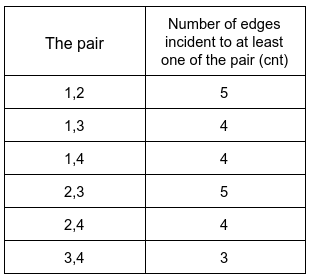LeetCode 1782. Count Pairs Of Nodes
Input: n = 4, edges = [[1,2],[2,4],[1,3],[2,3],[2,1]], queries = [2,3]
Output: [6,5]
Explanation: The number of edges incident to at least one of each pair is shown above.Input: n = 5, edges = [[1,5],[1,5],[3,4],[2,5],[1,3],[5,1],[2,3],[2,5]], queries = [1,2,3,4,5]
Output: [10,10,9,8,6]Solution:
PreviousLeetCode 1781. Sum of Beauty of All SubstringsNextLeetCode 1784. Check if Binary String Has at Most One Segment of Ones
Last updated
